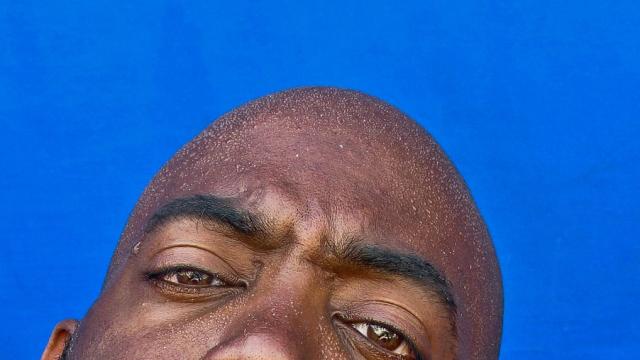With all the exuberant resolutions and New Year’s exercising, there’s going to be a lot of sweat — or sweating it — this month. The anxiety got us wondering, why do we sweat? Is it different in smell and texture depending on the cause? Does it sometimes maybe even smell good?
There are a lot of reasons we sweat. Extra spicy Indian food, a complicated contraption at the gym, or a high-stakes interview. All of the above can make you a schvitzing mess. But sweat’s main role is thermoregulator. If our core temperature gets too high and stays there, lots of bad things happen. Protein denaturation (something that also occurs in meat when you cook it), cell death, and finally organ failure can all go down inside an overheated body.
To keep all that nastiness from happening when things heat up, our body’s thermoreceptors send a signal to the hypothalamus — the centre of the brain that also controls hunger, thirst and sleep — which then tells the central nervous system to cool things down. The cooling system works like this: trapped thermal energy is released when water pushes though some two and a half million eccrine sweat glands and evaporates. It’s an incredibly effective mechanism, capable of sending a quart of liquid a day from the glands up through coiled tubes to the skin’s surface. Thermoregulatory sweat is 99 per cent water. The one per cent, in this case, is a mixture of salt and fat.
Sweat itself doesn’t smell, since it’s mostly made up of water. But when bacteria on the skin starts to digest the sweat, it can become fragrant.
Diet
Diet may play a part as well. A study out of the Czech Republic asked women to rate the body odor attractiveness of red meat eaters and people who abstained from red meat. Turns out the women liked better the scent of those who abstained from meat.
Eating itself can make you sweat. When you scarf down a meal, your metabolism increases, which gives your body temperature a bump, so you sweat to cool down.
The ingredients in food can also get you hot. Scientists think that capsaicin, which is found in spicy peppers, binds to the sensors in your mouth that deal with warmth. These sensors tell your body to trigger its thermoregulatory response. But this time the reaction is localised, so the sweat specifically drips from your face, scalp, and neck.
Emotions
Embarrassment, stress, or anxiety sweat has yet another set of characteristics. Emotional schvitzing happens on your palms, in your armpits, and on the soles of your feet. Depending on the humiliation level, a full-body sweat-fest is possible. Your palms and soles, in fact, don’t usually contribute to thermoregulation. Mostly they just act up in nerve-racking situations. These areas are also the most gland-dense in your body, with about 700 sweat glands per square centimeter. (The back, strangely, has the lowest sweat-gland density with just 64 per square centimeter.)
Sweating in times of turmoil gets more complicated as our emotions do. Before puberty, our pits don’t sweat when we’re nervous. But once we enter our tweens, two other types of sweat gland, apoeccrine and apocrine, come alive in emotional situations.
The apoeccrine glands function much like the eccrine, giving up a watery fluid.
But it’s the apocrine glands, which act up specifically when we’re experiencing anxiety, pain, or arousal, that get a bit more interesting. This variety of gland only appears in areas where we’re hairy — so, mainly, pits, nipples and nether regions. It’s oily, made of proteins, fats, and steroids, and the secretion by the shallow glands is sent out onto the hair follicle instead of straight to the skin like thermoregulatory sweat. Again, on its own the secretion doesn’t smell like anything, but because two of its proteins are odor-binding, they’re stink magnets. Volatile odor molecules released by bacterial enzymes hitch a ride to the surface of the skin with the liquid.
This ride-sharing, friends, is why we have BO.
There Is An Upside
Some studies suggest that these odours also have a pheromone-like effect. Studies have shown that women are sensitive to sweat produced by men during sexual arousal, and that smell is processed in a different part of the brain than normal old exercise-induced BO. That part of my brain never seems to be active when I’m stuck beneath a stranger’s smelly pit on the bus — for better for worse.
Image: Rafael Nadal of Spain shakes the sweat from his hair after his win over Alexandr Dolgopolov of the Ukraine during the Sony Ericsson Open at Crandon Park Tennis Center on March 29, 2011 in Key Biscayne, Florida. Photo by Matthew Stockman/Getty Images.
